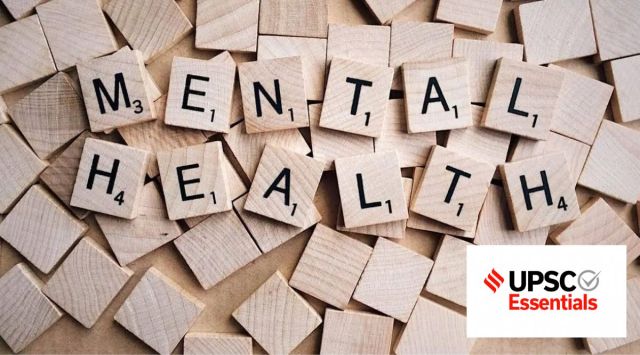We will cover one new subject four days in a week. Attempt today’s answer writing on questions related to topics of GS-4 to check your progress.

QUESTION 1
It is often believed that in India faith rules, and rationalism is a western stereotype. Do you agree?
QUESTION 2
CASE STUDY
Charu, a mother of a five-year-old daughter, was desperately struggling to cope with the unimaginable and most unwelcome crisis of the pandemic. She is a spiritual lady but the virus has shattered all the defense that created for herself to cope. Even after the pandemic situation has eased down, Charu has not been able to come out of the trauma. She locks herself with the child on the terrace of her house. Her family and friends are worried.
The family gives you a call. You have been Charu’s role model since the very beginning. In all her hardships, she has followed your path of advice. Even when she doesn’t ask for help it is expected of you to reach out to her.
(a) What will the basis of your line of explanation be to her?
(b) What can be the ways taken to take care of one’s mental and emotional well-being?
Story continues below this ad
THOUGHT PROCESS
You may enrich your answers by some of the following points
QUESTION 1
It is often believed that in India faith rules, and rationalism is a western stereotype. Do you agree?
Introduction:
For starters, you may begin simply by defining rationalism or you may start with a quote and directly bring it to the Indian context. For example:
— Immanuel Kant wrote in Critique of Pure Reason: “All our knowledge begins with the senses, proceeds then to the understanding, and ends with reason. There is nothing higher than reason.”
Story continues below this ad
— According to dictionary.cambridge.org, “It is the quality of being based on clear thought and reason, or of making decisions based on clear thought and reason.”
— Even in the Indian tradition, rationalists and sceptics have held out for scientific ideas since at least the 6th century BC.
(So, in a way you have set the tone by not agreeing with the statement and by getting straight away to Indian scenario.)
Body:
Your body must contain examples to support your stand which you have made clear in the introduction. The best way will be to base it on Indian Philosophy and various schools of thought. You may pick some of the following examples:
Story continues below this ad
— Ajita Kesakambalin, a contemporary of the Buddha, was the earliest known teacher of complete materialism. He is considered the forerunner of the philosophical tradition of the Charvakas, who privileged direct perception, empiricism and scepticism over Vedic ritualism.
— The original texts of the Charvakas have not survived, but references to their rationalist tradition is found in Buddhist and Jain works. The Buddha himself cautioned against accepting “what has been acquired by repeated hearing”, and encouraged contemplation and independent thinking.
— Within the wider Brahminical tradition, shades of opinion prevailed between the Brahmanas and the Shramanas, and many found their beliefs in the middle. The relationship between the two extremes was characterised as that between the “snake and the mongoose”, suggesting frequent philosophical debates and struggles.
— Debiprasad Chattopadhyay, who has chronicled the history of philosophy and science in India, has mentioned one Uddalaka Aruni in the Chhandogya Upanishad, who speaks of the importance observing phenomena that take place before the eyes, and not supernatural phenomena — the very essence of rationalism.
Story continues below this ad
— Let’s take Maharashtra as an example. The region that is now Maharashtra has a long history of radical thought that challenged several ideas embedded in the caste hierarchies of the Brahminical Hindu religion. It was here that Babasaheb Ambedkar embraced Buddhism, and the Republican parties carry forward his legacy in their own ways. Jyotiba Phule and Savitri Phule rejected caste and gender inequalities. The first recorded reservation in educational institutes for backward castes was instituted in Maharashtra by Chhatrapati Shahu Maharaj of Kolhapur (1894-1922).
— But Maharashtra was not the only state which saw vibrant social reform. Narayana Guru in Kerala and E V Ramasamy Naicker ‘Periyar’ in Tamil Nadu were early advocates of progress. The Self-Respect movement in Tamil Nadu, and the Left movements in Kerala and West Bengal made a strong case for rationalism and egalitarianism, and rejected blind faith. In the early modern period in Bengal, Raja Ram Mohan Roy and the Brahmo Samaj led the charge against regressive tradition.
Do not forget to add a point referring to The Indian Constitution or India’s freedom struggle. It will provide further sanctity to your answers. For example,
— Article 51A(H) of the Constitution of India gives a call “to develop the scientific temper, humanism and the spirit of inquiry and reform”.
Story continues below this ad
— The leaders of the national movement hoped that the lofty ideals of the emerging Indian state would encourage a modern and progressive outlook. Privileging a civic idea of the nation over blood or faith, caste or creed, would be vital to keep a diverse and unequal country together, they believed.
(Source: Indian rationalism, Charvaka to Narendra Dabholkar by Seema Chishti)
Conclusion:
Your conclusion can be a general statement in the present day context. For example,
— Covid times: It was natural and normal for us to be taken over by despair during covid crisis. A voice that chattered within us non-stop, talked “Doomsday” and the fight or flight response made us anxious one moment, our hearts full of sorrow the next and angry the very next, taking us on an emotional rollercoaster! It was talk within us that just refused to quieten down. One of the ways to beat it was ‘rationality’ rooted in our Indian tradition and practices, not any western stereotype…
Story continues below this ad
(Source — Matters of the mind: Caution, courage and rationality may be answers to the crisis)
QUESTION 2
CASE STUDY
Charu, a mother of a five-year-old daughter, was desperately struggling to cope with the unimaginable and most unwelcome crisis of the pandemic. She is a spiritual lady but the virus has shattered all the defense that created for herself to cope. Even after the pandemic situation has eased down, Charu has not been able to come out of the trauma. She locks herself with the child on the terrace of her house. Her family and friends are worried.
The family gives you a call. You have been Charu’s role model since the very beginning. In all her hardships, she has followed your path of advice. Even when she doesn’t ask for help it is expected of you to reach out to her.
(a) What will the basis of your line of explanation be to her?
Story continues below this ad
(b) What can be the ways taken to take care of one’s mental and emotional well-being?
Introduction
There can be many ways to start a case study. One of the ways that a candidate may choose is by putting forward general statement revolving around the issue. For example:
In a situation, such as mentioned in the case study, in which there may not be a significant threat, a person can still experience anxiety and apprehension about contracting COVID-19 again.
An illness-related anxiety can significantly impact the life of any individual. If a person’s quality of life and functionality are getting affected, seeking help at the earliest is important. The support of those who surround you is critical in such situations.
Body
(a) What will the basis of your line of explanation be to her?
You may focus on three points.
1. Spirituality
2. Philosophy
3. Being a mother, her responsibilities
(You are is limited to immediately pacify, before a necessary mental help counselling.)
JUST FYI:
There is something about psychology and spirituality; where one ends, the other loops in, like an infinity band, dynamic, rotating swiftly showing you the meaning you choose to see. The union of a spiritual attitude and rational perception can be a very powerful tool in dealing with this crisis or any that comes our way.
Note: The question doesn’t ask for the course of action but the basis of the course of action. You may base it on ethics, spirituality, and philosophy, as hinted in the case study itself. Do not step beyond what is asked!
(b) What ways can be taken to take care of one’s mental and emotional well-being?
This is a general question that requires basic points in your answer. Such as,
(1) Build a good support system: Surround yourself with those who share accurate information, are calm and considerate in the ways in which they respond to your experiences.
(2) Actively relook at and reframe negative thoughts: It is important to move away from your tunnel vision where the focus is only on those aspects which confirm your beliefs.
(3) Try to ensure that the avoidance of feared situations is averted. Avoidance tends to increase anxiousness.
(4) Focus on maintaining routines and encourage yourself to engage in daily tasks and chores and steadily build on the same over time.
(5) Talk to experts to get the right information, gain an understanding of what is happening, actively work towards modifying your thoughts and beliefs and taking care of your well-being. Break down anxiety-provoking activities into smaller steps like stepping out into social spaces.
Conclusion:
You may concluded by quoting something on ‘crisis management’ or why you need to act responsibly.
Note 1: Do not miss to highlight that eventually a mental health counselor will be required.
Note 2: You can have different methods, ways, and styles to answer a case study.
(Source: Matters of the mind- Caution, courage and rationality may be answers to the crisis, Here are five ways to deal with extreme COVID anxiety)
Post your inputs and answers to points to ponder in the comment box below and engage with other aspirants too. All the best!
(The UPSC Essentials Indian Express is now on Telegram- Indian Express UPSC Hub. Click here to join our YouTube channel and stay updated with the latest updates.
Note: Catch the UPSC Weekly Quiz every Saturday evening and brush up on your current affairs knowledge.)
Share your views, answers and suggestions in the comment box or at manas.srivastava@indianexpress.com


































